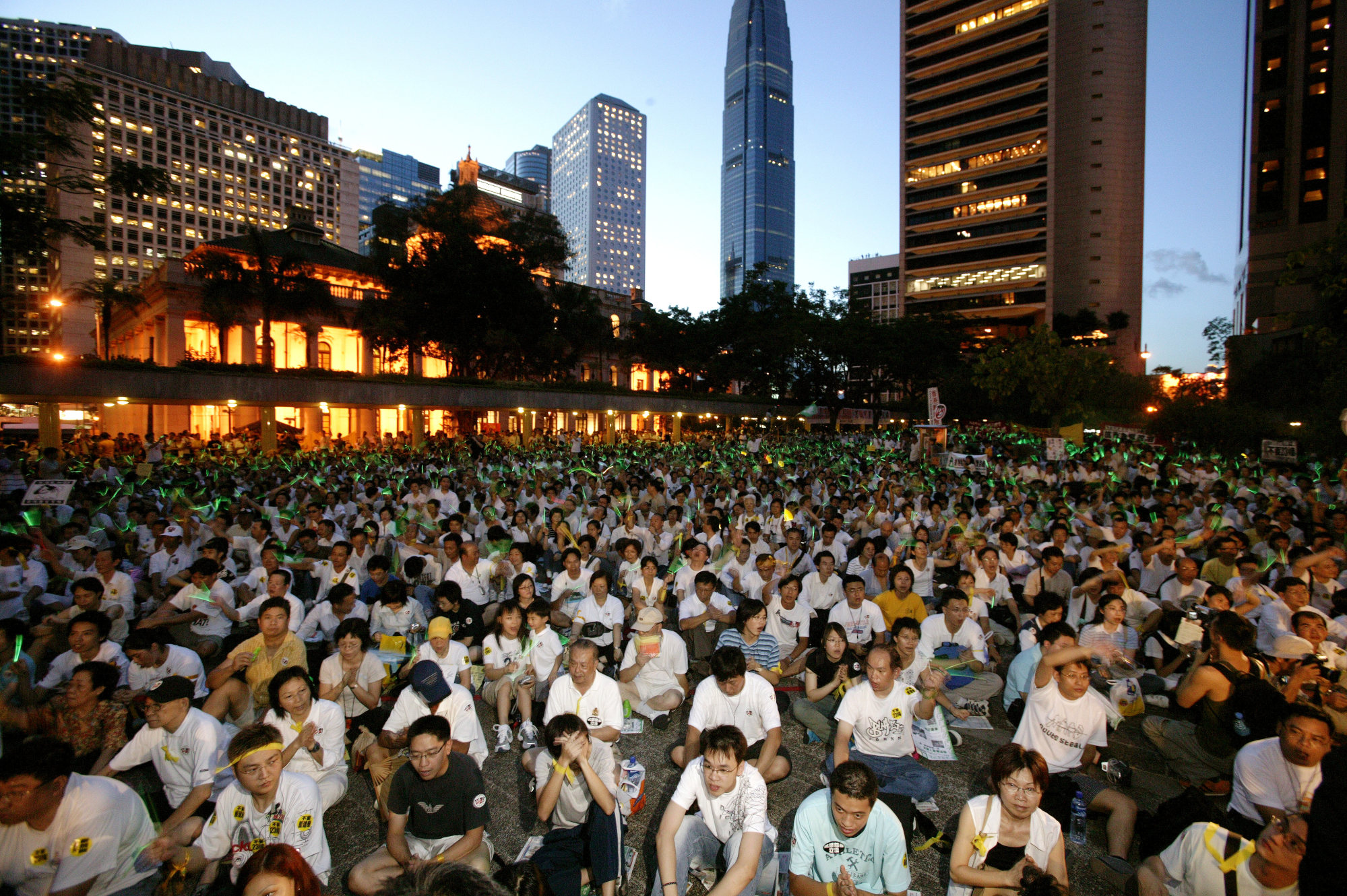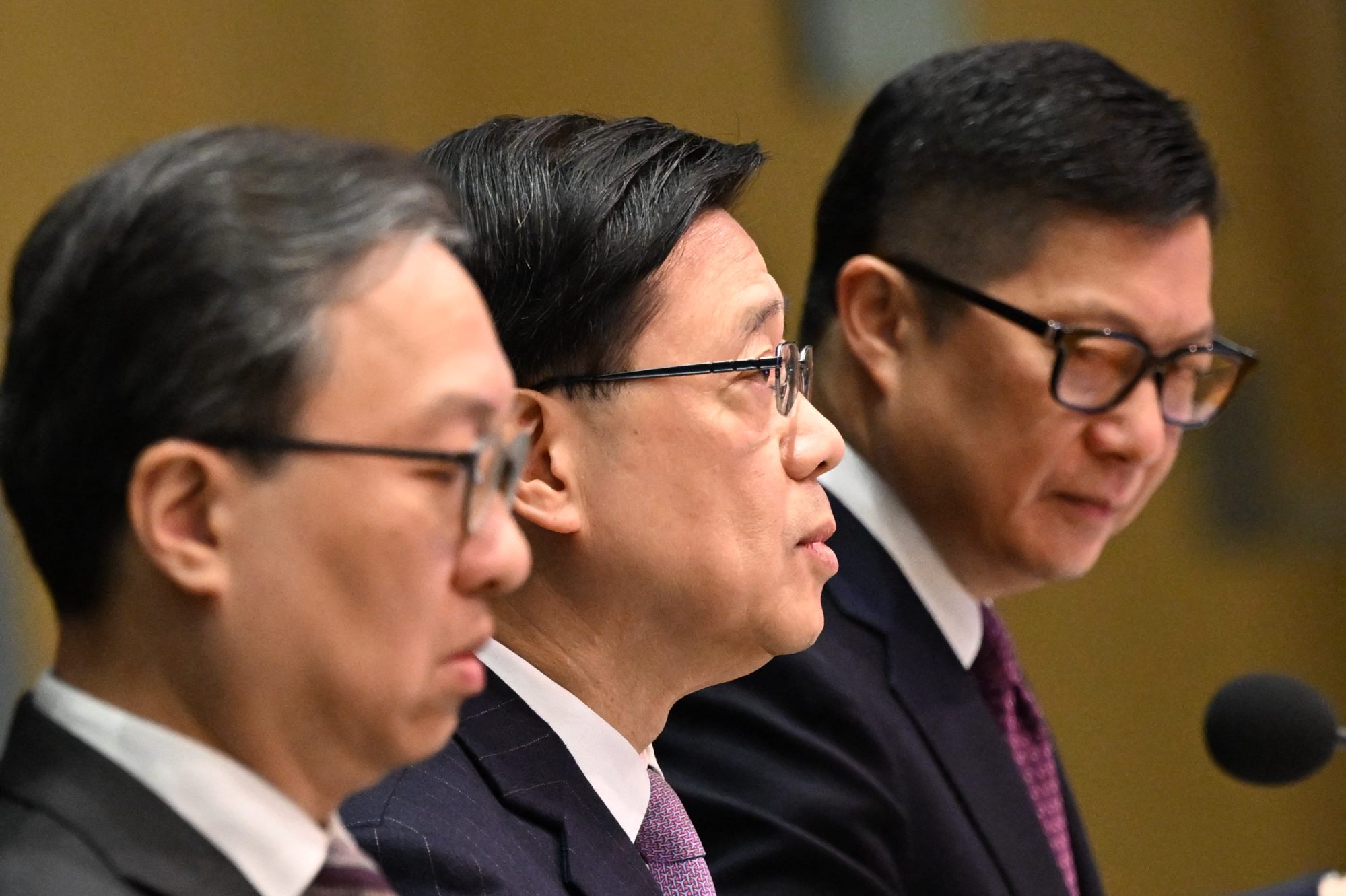
‘Totally different’ Hong Kong political climate paves way for smooth passage of domestic national security law compared with earlier attempt
- John Lee had more room to move the bill with a patriots-only legislature and Beijing-imposed security law in place
- US-China tensions and city as ‘pawn’ make for strong case of new law, say analysts
Yet on Tuesday, the city’s legislature sailed the bill through unanimously with all votes aligned behind the new law, a stark contrast from 2003.
Back then, in response to the massive protest, the city’s first post-handover leader, Tung Chee-hwa, withdrew the legislation.
Three other chief executives after him steered clear of the thorny topic.
But analysts said there was also an unspoken understanding from Beijing that it would be patient and wait for the right time to reintroduce the law.

That timing appeared to coincide with the tenure of the city’s fifth chief executive, John Lee Ka-chiu. When he was elected in 2022, he vowed to enact the law which is mandated by Article 23 of the Basic Law, the city’s mini-constitution, within his term of office.
“Some [subsequent] chief executives [after Tung] might have seen it as a hot potato that should be avoided,” said Professor Lau Siu-kai, a consultant at semi-official Beijing think tank the Chinese Association of Hong Kong and Macau Studies.
“If things turn ugly again once you touch it, it is to commit political suicide.”
Another critical factor that made the legislation a key item in John Lee’s to-do list also had to do with the vastly changed geopolitical environment. In 2003, China and the United States were not viewing each other as rivals.
Given a harsher environment in which Hong Kong had become a pawn in the relationship, the central government felt compelled to move forward considering the bigger environment.
Seen in this context, “Hong Kong is not rushing through the law”, Lau added.
“Actually, Hong Kong has been dragging its feet for more than 20 years.”
Article 23 stipulates that the city government should “enact laws on its own to prohibit any act of treason, secession, sedition, subversion” against the central government.
The proposed legislation is also designed to ban the theft of state secrets and stop foreign political bodies from carrying out political activities in the city, as well as bar Hong Kong political groups from establishing ties with overseas counterparts.
Hong Kong’s first bid to pass legislation to fulfil Article 23 came about five years after the 1997 return of the city to Chinese rule.
The government at the time released proposals to create domestic national security legislation in September 2002 for a three-month public consultation.
A bill was drafted in February the next year in the hope it would be law by July.
But fears about the civil rights and freedoms guaranteed under the Basic Law would be compromised jettisoned the bill and critics said also paved the way for Tung to resign, even though he cited health reasons for his early retirement in 2005.
When half a million people took to the streets on July 1, 2003, in what was then the largest demonstration since the 1997 handover, with protesters also expressing discontent over the poor post-Sars economy and other livelihood issues, the bill was abandoned.
Lau said Hong Kong’s failed bid in 2003 was partly a result of a freer hand the central government had offered Hong Kong.
“But the opposition camp abused Beijing’s goodwill gesture and made use of the Article 23 saga to spread fears,” said Lau, who was the head of government think tank the Central Policy Unit in 2003.
He added the 2003 debacle tainted the idea of national security legislation as a poisoned chalice for subsequent chief executives.
After Tung’s resignation in 2005 amid speculation that Beijing was unhappy with his performance, successor Donald Tsang Yam-kuen made no attempt to reintroduce the bill.
Tsang said in his 2010 policy address the majority view was that it should be deferred.
“Legislating [Article 23] is a constitutional obligation,” he said. “But the people needed to understand the logic of the measure, something that could only be achieved when the time was ripe.”
His five-year term was marked by the 2014 Occupy Central protests, the 2016 Mong Kok riots, and the rise of localism.
In 2016 after an oath-taking controversy involving some new pro-independence legislators, Leung put the focus back on the need for a domestic national security law.
“I believe Hong Kong people in the past did not see the possibility of people advocating independence or secession, but now we see it,” Leung said. “So this is a problem we should pay attention to.”
But he stopped short of announcing a plan to put forward Article 23 legislation.
All you need to know about Hong Kong’s domestic security law
But Lam avoided committing to a time frame as that was beyond her control, insiders said then. Instead, she said the government would work to “create favourable conditions” for the legislation and lead a rational public debate.
“The government is to create conditions,” she said on her first official working day as the chief executive in July 2017.
The controversy degenerated into violent confrontations between protesters and police. The Covid-19 pandemic led to protests dwindling and in June 2020, Beijing imposed a sweeping national security law on Hong Kong.
Hung Wing-lok, a political scientist at the Chinese University of Hong Kong, said the 2019 anti-government protests made Beijing determined to prevent the city from becoming an anti-China base and challenge to the Chinese Communist Party.
Hung added the Beijing-led electoral changes, which brought about a legislature with no opposition bloc, had also laid the foundation for the smooth passage of a domestic national security law this time.
The latest effort to enact Article 23 started with a month-long public consultation which began on January 30 and ended a month later on February 28. With Tuesday’s passing, it took the government 50 days from draft to done deal.

While critics have been far more muted than in 2003 in the absence of an opposition bloc, there were rumblings about the swift passage of the legislation.
“If a piece of legislation is well written, it does not matter whether Legco takes a short time or one year to pass it. A good law will be a good law.”
Tong added that even if Hong Kong could have successfully enacted Article 23 in 2003, it would now be time for revisions.
“The world has changed a lot over the past 20-something years,” he said. “And the concept of national security is also different. You can see that in the US – using Tik Tok can be said to be a threat to national security.”
Breadth, penalties of Hong Kong’s domestic national security law under scrutiny
One of the few opposition parties still around – but with no elected representative – the Democratic Party said it did not see itself changing its stance.
Party chairman Lo Kin-hei: “We are not cooperating with any foreign political groups and we have never received money from any foreign groups.
“We do not believe our operation will suddenly become problematic after Article 23 is enacted.”

